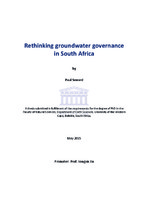| dc.description.abstract | Governance is essentially the process whereby organisations or networks of organisations exercise their authority. It describes how a body with authority makes or does not make decisions, and how it implements - or does not implement - those decisions. 'Good' groundwater governance can then be defined by how fair the decision-making process is, and how effective the implementation process is. Groundwater governance in South Africa is increasingly being categorized as ineffective. The purpose of this thesis is to explore ways to improve groundwater governance in South Africa. Initial reviews of international studies of groundwater governance did not find any processes that could be directly imported into the South African governance landscape for testing. The global consensus was that there were no blueprints for improving groundwater governance, and that each case should be treated as unique. Therefore the thesis had to change from its initial aim of finding firm rules that could be tested in the South African context, to a revised aim of formulating tentative heuristics, rules, strategies and hypotheses that might be useful for further work in the South African context.An exploratory, inductive-based, loosely structured methodology was therefore employed rather than a more formal, deductive-based testing of hypotheses. In short, the objective of this thesis was concerned with formulating hypotheses rather than testing them.The novel, general, contribution made by this thesis is to synthesize global groundwater governance literature with the specific aim of improving groundwater governance in a specific country. While reviews of global literature do exist, they have thus far only been used to make generic recommendations, and have not been specifically applied to a country. Conversely, while attempts to improve groundwater governance for specific regions and countries do exist, these attempts have largely done so without synthesizing existing global knowledge. Indeed, the emphasis on national, regional and local studies has principally been to understand the factors at work affecting groundwater governance, rather than to improve governance. | en_US |

